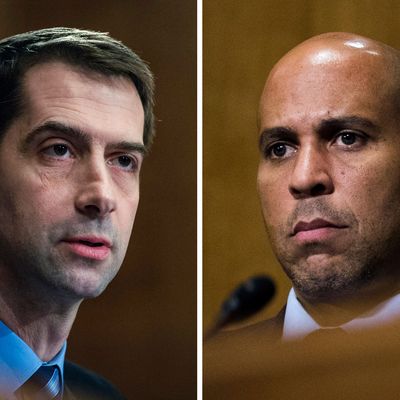
The long-delayed consummation of a modest, bipartisan federal criminal-justice-reform push began to look more likely a few weeks ago when President Trump signaled support for a Senate deal that combined a House-passed prison-reform bill with some key sentencing-reform provisions. The House bill was to a considerable extent the handiwork of presidential son-in-law and Minister Without Portfolio Jared Kushner, who then worked hard on The Boss to get him to sign off on adding in some elements of a bipartisan sentencing-reform bill that came tantalizingly close to enactment in 2016 before it succumbed to Senate Republicans who thought it might conflict with Trump’s law-and-order rhetoric on the campaign trail. Perhaps, many observers thought, Trump could provide cover for any GOP senators fearful of doing the right thing to relax mandatory minimum sentences created during the ancient and failed War on Drugs because it might make them look “weak” on crime.
This strategem is now running into some predictable opposition in the Senate from two different directions. Longtime criminal-justice-reform nemesis Tom Cotton (whose basic position is that America has an “under-incarceration problem”) published a Wall Street Journal op-ed last week denouncing the proposed compromise as constituting a “jailbreak:”
[U]nder no circumstances should Congress cut mandatory minimum sentences for serious crimes or give judges more discretion to reduce those sentences. That foolish approach is not criminal-justice reform—it’s a jailbreak that would endanger communities and undercut President Trump’s campaign promise to restore law and order.
The U.S. faces a drug epidemic today, exactly the wrong time to go soft on crime.
Cotton’s belief that it makes sense to address the opioid crisis with the harsh sentencing tools that so notably failed during the crack epidemic of the 1980s is more than a little dubious. But he’s on solid ground when it comes to the race-fueled crime rhetoric that has been a Republican staple since the 1960s. And he has an unknown number of Senate sympathizers, as the Hill reports:
Besides Cotton, other reliable allies of the White House, including Senate Majority Whip John Cornyn (R-Texas), are opposing the administration’s approach, which would combine a House-passed prison reform bill with changes to sentencing and mandatory minimums that have wide, bipartisan support in the Senate.
But the compromise initiative has an additional problem: a tepid reception from Senate Democrats who prefer the original 2016 bipartisan bill to any new watered-down package designed to get Trump on board. Criminal-justice-reform activist Cory Booker is already expressing skepticism:
“The bipartisan bill that we passed out [of the Judiciary Committee], which was negotiated extensively, was the compromises that I wanted to make,” Booker told The Hill. “For me to give up on something that was negotiated. I find it hard to think that would cut mustard for me.”
“I’m still open to seeing what would happen, but remember we fought really hard for what was in that bill and to have it be vacated to get an even more watered-down one is concerning to me,” he added.
Kamala Harris — like Booker, a much-discussed 2020 presidential possibility — is also thought to be resistant to a Trump-supported compromise. Dick Durbin seems to be the principal Democratic negotiator in the Senate, but it’s unclear how much support he has among other Democrats.
All in all it’s a very sensitive situation, particularly this close to a midterm election. Trump might be able to isolate Cotton and Cornyn with a few phone calls or meetings. But on the other hand, at a time when he is widely reported to be settling on a “rev up the base” approach to the midterms, he might be tempted to launch a few polarizing “law and order” tweets that scorch any common ground on criminal-justice issues. Presumably Jared Kushner knows this, and a lot will depend on his ability to keep Trump under control while the process works itself out in the Senate. One good thing is that Attorney General Jeff Sessions, who has been even more adamantly opposed to criminal-justice reform than Cotton, is probably not exercising a lot of influence in the White House these days.
In the end Senate Democrats will probably come around to support a compromise if they are convinced it’s the best deal they are going to get. So while no one should place a bet on it, the odds are reasonably good that a rare bipartisan achievement is in the offing at a most unlikely time.






























